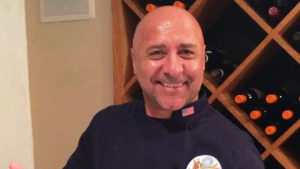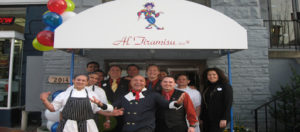
Luigi Diotaiuti

Born on a family farm in Italy, Chef Luigi Diotaiuti attended culinary school in Maratea(where he remains a distinguished alumnus and sought-after speaker) and has since risen to the heights in his field, working in kitchens in some of the world’s finest restaurants and overseeing the kitchen at Al Tiramisu in Washington, DC for 25 years.
Named “Ambassador of Basilicata’s Cuisine in the World” by The Federation of Italian Cooks in 2017 and “The Ambassador of Italian Cuisine” by the Federation of Italian Cooks in 2018, Chef Diotaiutiis also a member of The James Beard Foundation, The Diplomatic Culinary Partnership, Slow Food DC, The International Association of Culinary Professionals, the Culinary Historians of Washington, The Federation of Italian Cooks, the American Chefs Corps Network through the U.S. Department of State, and is affiliated with the National Concierge Association and Ciao Italia. In 2018, he was honored with the prestigious “La Toque” award by The National Area Concierge Association at The Basilica of the National Shrine of the Immaculate Conception in Washington, DC.
In addition to being an award-winning chef, Chef Diotaiuti is also a certified Sommelier and favorite of celebrities and media outlets around the world. An American and Italian citizen who strives to support communities in both homelands, he recently created a non‐profit organization called Basilicata: A Way of Living to maintain the local traditions of the region while creating jobs and tourism. He is also the founder of Pasta Lab, an event that pairs professional chefs with female home cooks to uphold the artisan pasta-making traditions of the past. In Washington, Chef Diotaiutialso teaches students in the culinary program at DC Central, cooks with local school children, and conducts demonstrations in area farmers markets, culinary competitions, and benefit events.
With help from Chef Amy Riolo, Chef Diotaiuti created a television series and the documentary The Beauty of Basilicata at the James Beard Foundation in honor of the dinner he served there in 2013. The dynamic duo also wrote Chef Luigi’s first cookbook,The Al Tiramisu Restaurant Cookbook: An Elevated Approach to Authentic Italian Cuisine, in 2013 andled a culinary cruise from Istanbul to Athens in 2014.

How did you get into cooking? Who inspired you?
I was born on a farm near Lagonegro, in the mountains of the Southern Italian province of Basilicata, where we learned the relationship between people and food firsthand. We were practically completely self-sufficient in terms of culinary ingredients (with the exception of coffee and olive oil). I used to tend to the family’s goat herd, help my mother and father with cheese making and other activities, and help my grandmothers in the kitchen. Food production was our way of life! It was never a separate part of my existence, and it is still that way today. When I was 14, I had the opportunity to attend culinary school in the seaside resort of Maratea, and I knew from my first day of class that this was what I wanted to do. After school, my formal training included working in renowned restaurants such as the Hotel Georges V in Paris, the Grand Hotel Bauer Grunwald in Venice, Il Gourmet restaurant and Hotel Bellavista in Montecatini, Tuscany and Costa Smeralda and Forte Village in Sardinia. I opened Al Tiramisu restaurant in 1996 and was awarded the coveted Insegna del Ristorante Italiano( the seal of approval by the President of Italy) and Slow Food DC’s “Snail of Approval” award. In 2019, we were named “One of Top 50” Italian restaurants in the world by 50 Top Italyand this year we are celebrating our 25thanniversary!
Where was your first professional kitchen experience and what lessons did you learn that continue to educate how you work today?
I worked at two restaurants in mainland Italy – one in Calabria and one in Emilia Romagna – but it was my third post at Costa Smeralda and Forte Village in Sardinia where I worked for Chef Gerardo Novi that actually changed my life. He taught me refinement and tranquility in the kitchen as well as how to transmit calmness and organization to my team under any circumstances. His level of presentation and professionalism was like nothing I had ever seen, and I always aspired to be like him. He still inspires me today.
What have been the biggest challenges you have faced and how have you handled them?
Although I am fortunate that my restaurant has been a celebrity favorite for decades, it wasn’t all easy. Being located within walking distance to the White House has presented us many challenges in the 25 years that we have been open. Political unrest starting with September 11 caused a lot of problems. The recession in 2007, 2017’s government shutdown for a month and a half, government protests, and the pandemic that we are currently facing made it necessary for me to always be on my toes.
In addition, it requires deeply committed relationships to my staff, our clients, and the community in order to survive. Because I grew up on a farm in Basilicata, Italy, I am no stranger to sacrifice. Leading a team through these types of situations takes passion, care, commitment, and a great deal of hard work.
What has always worked for us, whether it was during the recession or what happened with the pandemic, is that I never fire anyone due to trying times. When we are faced with these situations, I meet with my team. I explain to each person the important role that they play in the business. I tell everyone that we have to make cuts together, not just one person or another. For example, when I was growing up, we were a family of eight, and when times were tough, we all had to sacrifice. Then, when things got better, everyone enjoyed more. If someone decides to leave, that is their choice, but I don’t fire people to make cuts.
How has your cooking and business style changed and how has the industry changed?
The industry has changed very much in my 44-year career – from classic cuisine when I started to traditional food that was made with diesel stoves and large brigades in the kitchen to nouvelle cuisine to fusion to New American.
My cooking has changed because I learned standard continental cuisine since that’s how we were trained. I began using my restaurant and media platform to promote the cuisine and culture of my region. Then I decided to start a nonprofit in Italy called Basilicata: A Way of Living, which I founded in 2013. I have always been interested in agriculture and the environment, and I have dedicated this last decade of my life not only to applying particular practices in my home and restaurant, but also to making a difference in the world. After Expo Milano 2015, the world addressed the fact that globalization was affecting everyone. We are now seeing an emphasis placed on zero-waste, root-to-tip usage of vegetables, etc. This was always the way of farmers and is the way I have operated from the beginning.
What are you most looking forward to this year, in terms of your career?
I am proud and happy that we are able to celebrate our 25thanniversary at Al Tiramisu. I am looking forward to being able to open back up to full capacity and appreciating our old “typical nights” even more. But what really inspires me is the changes that I am able to make in our community and the knowledge that I pass down for future generations of chefs, farmers, and citizens. One thing that the pandemic has allowed me is to take advantage of more media opportunities in Italy via Zoom and other platforms. We have been able to continue to promote time-honored traditions and genuine footways and even sustainable agriculture through these events. I have also been able to give classes online and start an initiative called #ChefLuigiCares to give back to our community. I am looking forward to expanding all of these causes and contributing even more once we can have live events again. Now more than ever, I am dedicating more time and commitment to making sure that sustainable agricultural practices are protected, promoted, and put to good use in our global economy.
Capretto al Forno/Oven Roasted Baby Goat
(from The Al Tiramisu Restaurant Cookbookby Luigi Diotaiuti)
The rugged terrain of Basilicata and Calabria makes the area well-suited to goat grazing, and the tender, tasty meat of baby goats from the area is especially valued. What makes the meat so flavorful is due partly to the physiology of goats – they can stand two meters high on their hind legs, which allows them to eat a wide variety of herbs and tree leaves in the wooded areas.
My attachment to this dish is deep, dating back to my childhood when I herded our goats. Sometimes I lost track of them and to gather the herd I held out a branch of a hornbeam or ash tree, whose leaves they loved. The goats smelled it and came running toward me, making it easy to do a head count.
This dish also evokes spring celebrations like Easter and weddings, which always included roasted baby goat on the menu. Its festive quality is one reason why I placed this recipe on my “Beauty of Basilicata” menu at the James Beard Foundation. The dish was unexpected and very well received. With its health benefits and the greater availability of goat meat in this country, I expect to see goat meat on more and more menus.
I love this dish for its simplicity and unparalleled flavor. But keep in mind that with just a few ingredients as the main protagonists, they must be of superior quality.
Serves 6
INGREDIENTS
2 1/2 pounds goat or baby goat meat cubes, from the thigh or shoulder, about 1 ½ inches each
6 cloves garlic, sliced
½ pound yellow onions, peeled and chopped
4 fresh rosemary sprigs, finely chopped
6 fresh thyme sprigs, finely chopped
Salt
½ cup extra virgin olive oil
1 pound Yukon Gold potatoes, scrubbed, peeled, and cut into 1-inch pieces
4 sundried sweet peppers, finely diced
DIRECTIONS
In a large glass baking dish, place the goat cubes, garlic, onion, rosemary, and thyme.
Mix well to combine and cover with plastic wrap. Let marinate in the refrigerator for at least one-half hour, or overnight.
When meat has marinated, preheat the oven to 400˚F.
Add a tablespoon of salt to the meat, drizzle with olive oil, and mix well with the potatoes to combine. Roast uncovered for 20 minutes.
Reduce heat to 350˚F. Add the sundried sweet peppers and mix well.
Roast, uncovered, until meat is tender and potatoes are cooked through and golden, about 20 minutes.
Italian Cooking Note
This same cooking method can be used for beef or lamb with optimal results. Carrots and parsnips also make great additions or substitutions for the potatoes.
See Matt’s other food-related pieces at www.Matts-Meals.com.
